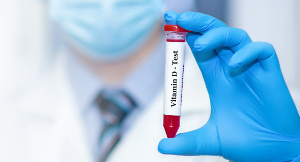Vitamin D deficiency is linked to COVID-19, complications, and death
 The body’s vitamin D status can be used to predict the risk of contracting COVID-19, developing serious symptoms in the acute disease phase, and dying of its complications. This was demonstrated in a large Chinese study, where majmost of the hospitalized COVID-19 patients lacked vitamin D.
The body’s vitamin D status can be used to predict the risk of contracting COVID-19, developing serious symptoms in the acute disease phase, and dying of its complications. This was demonstrated in a large Chinese study, where majmost of the hospitalized COVID-19 patients lacked vitamin D.
Most people who get COVID-19 have few and comparatively mild symptoms, or don’t have any symptoms at all. In rare cases, acute respiratory failure may develop. This is known as ARDS (acute respiratory distress syndrome) and is a result of an unhinged immune defense that causes hyperinflammation and damages the pulmonary epithelium. Hyperinflammation may also cause damage to the blood vessels and organs, eventually resulting in circulatory failure and death.
How vitamin D status can predict the disease course and the risk of death
Vitamin D is important for our innate immune response that tackles most germs without causing noticeable symptoms. It also supports the adaptive immune defense that produces immunity with help from white blood cells (T and B killer cells) and antibodies.
Multiple studies have shown a link between vitamin D deficiency and COVID-19 infection, but the mechanisms are not fully known. In the new Chinese study, the scientists looked at blood levels of vitamin B and the severity of COVID-19 in 399 adults, who were hospitalized in different hospitals. The researchers also looked at blood levels of white blood cells and different markers, namely:
- Neutrophilic granulocytes - white blood cells in the innate immune defense
- Eosinophilic granulocytes - white blood cells in the innate immune defense. An overproduction of these can damage tissue
- T and B killer cells – part of the adaptive immune defense
- C-reactive protein (CRP) – an inflammation marker
- Interleukin 5, 6, and 10 (IL-5, IL-6, and IL-10) – which are cytokines and inflammation markers
- D-dimer – a marker that is used in situations where there is a suspicion of pulmonary embolism
The COVID-19 patients were divided into four groups, depending on the severity of their symptoms. The scientists observed that most of the patients had low blood levels of vitamin D, and those COVID-19 patients who had the lowest levels died of their infection.
Blood levels of vitamin D were significantly linked to the severity of the COVID-19 infection in the acute disease phase. The scientists found that low blood levels of vitamin D combined with elevated levels of IL-5 (interleukin-5) and eosinophilic granulocytes could be used to predict the severity of a COVID-19 infection and the risk of dying of the disease.
The study is published in Virology Journal. Here, the researchers address vitamin D’s role in helping the immune defense regulate inflammatory processes in the acute disease phase.
Lack of vitamin D is widespread among vulnerable people
The sun is our primary source of vitamin D. We can synthesize the vitamin in our skin through a biochemical conversion of a cholesterol precursor. An estimated one billion people worldwide are believed to lack vitamin D due to limiting factors such as the dark winter period, having dark skin, being overweight, having diabetes, being old, and using statins. This can make it difficult to synthesize or utilize vitamin D. Genetic factors also mean a lot.
The body’s actual need for vitamin D and possibly supplementation varies from person to person and is typically a lot more than official recommendations call for. What is important is to strive to have optimal blood levels of vitamin D all year and throughout life. The international guidelines for vitamin D status are as follows:
Deficiency: Below 50 nmol/L
Insufficiency: below 75 nmol/L
Sufficiency: 75-160 nmol/L.
References:
Yali Qiu ert al. Vitamin D status in hospitalized COVID-19 patients is associated with disease severity and IL-5 production.
Fausto Petrelli et al. Vitamin D3 and COVID-19 Outcomes: An Umbrella Review of Systematic Reviews and Meta-analysis. Antioxidants 2023
Deirdre K. Tobias et al. Association of Body Weight With Response to Vitamin D Supplementation and Metabolism. JAMA Network Open, 2023
TIP! See also the related articles
Search for more information...
- Created on .








